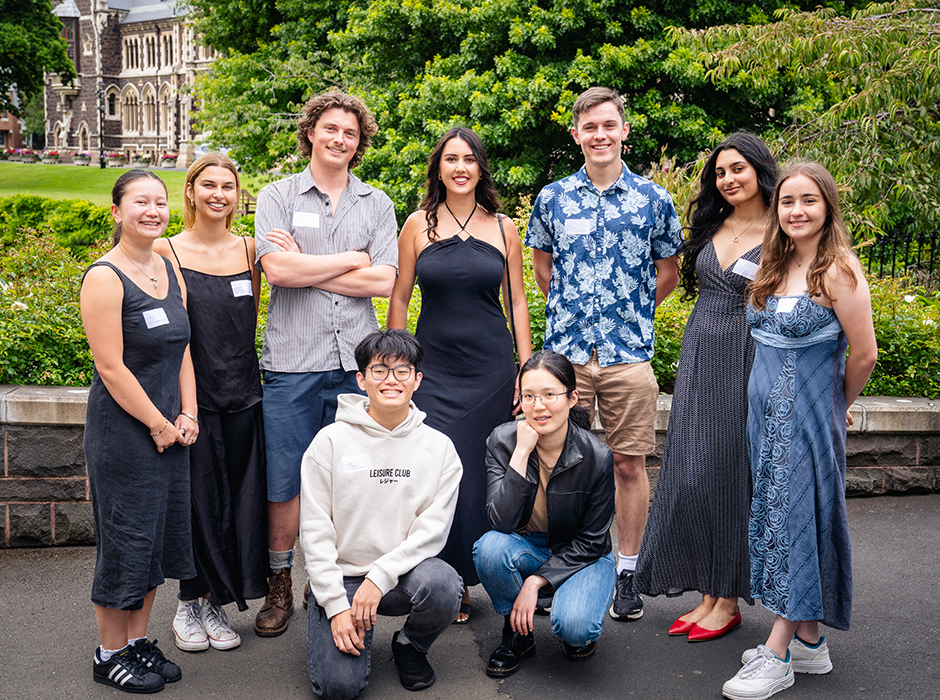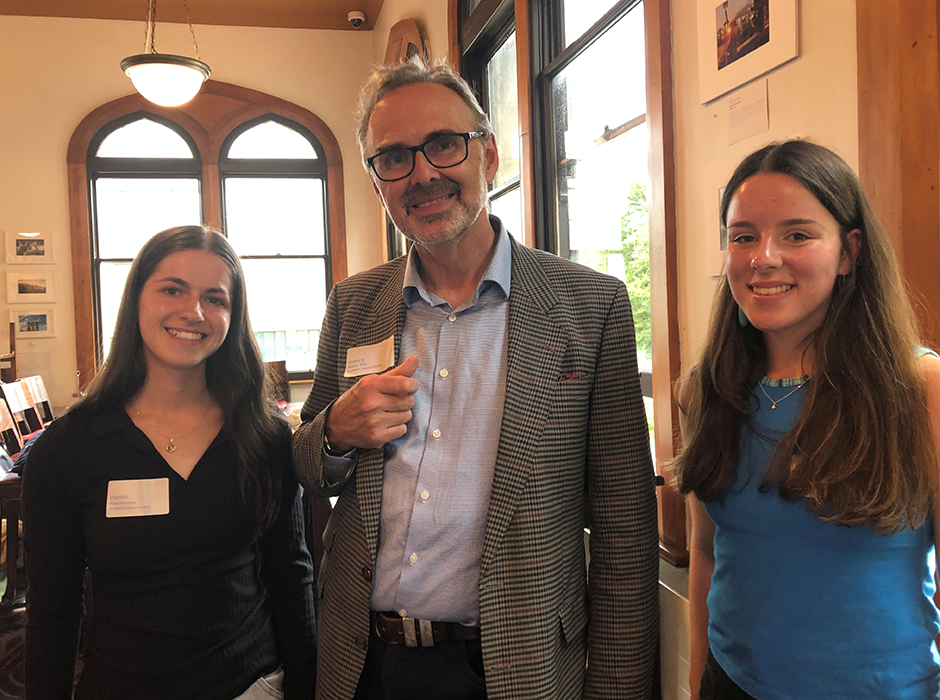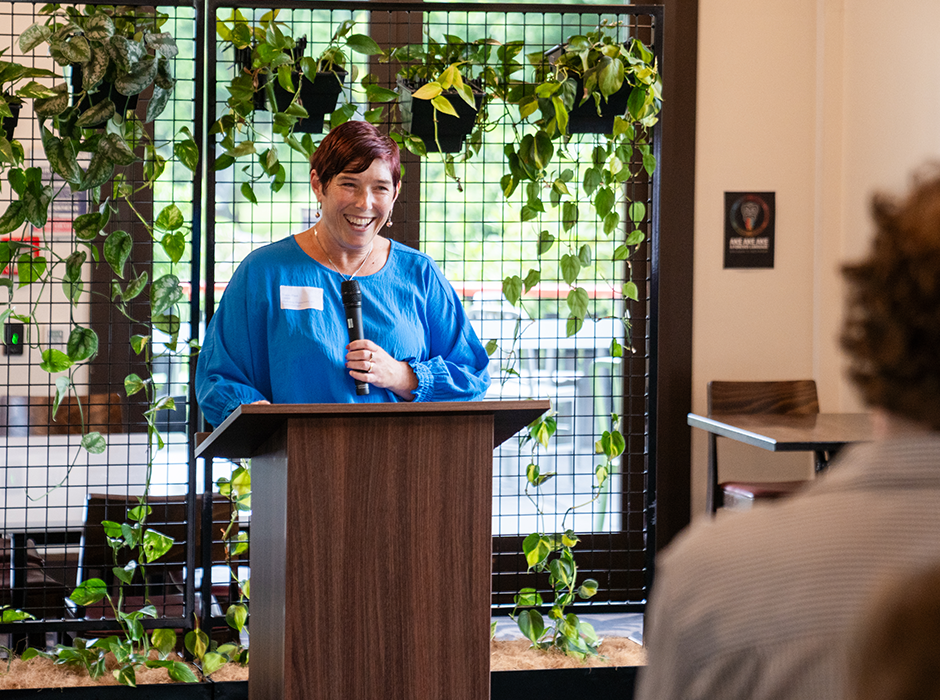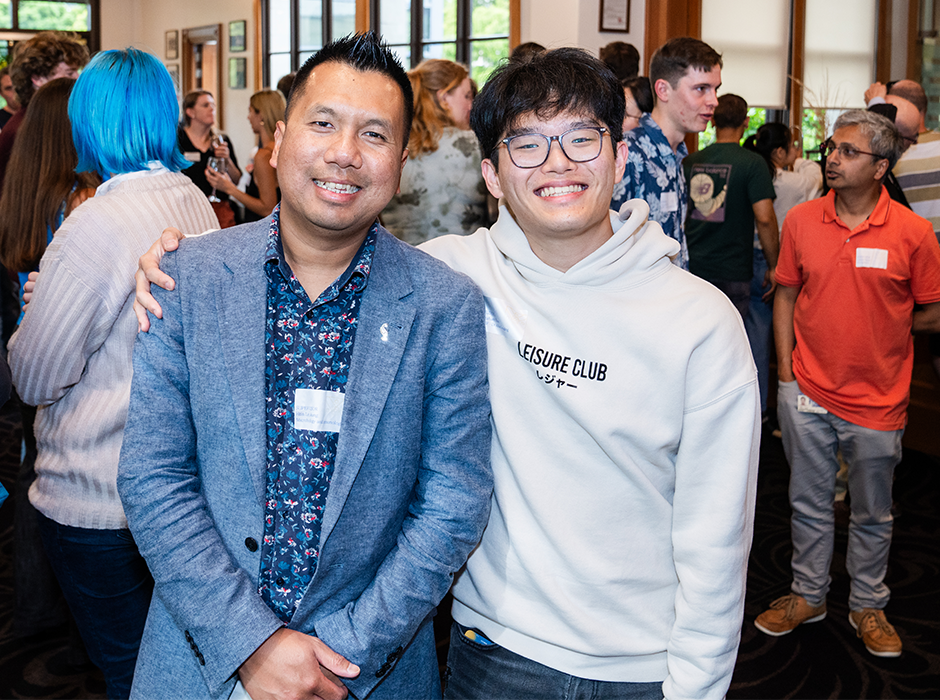
Nine of the 11 students funded by the OMRF in 2024: back row from left: Ally Genet, Asha Bhakta, Connor Nicholls, Janaya Mitchell-Byrne, Luke Geddes, Shivannee Ganeshan, Nicole Whittaker. Front row: Abraham Siaw and Teresa Gu. Absent John Clemance and Emma McKay
Students, sponsors and supervisors all agree that Otago’s Summer Research Scholarship Programme is “a real game changer” for everyone involved.
A lively group gathered at the University of Otago Staff Club recently to acknowledge all those who make the initiative possible, and to celebrate another successful summer of research.
Welcoming everyone to the get-together, Director of the Programme, Professor Greg Jones, thanked the generosity of the donors and congratulated the students who received scholarships. He also thanked the supervisors for their commitment to the students and the programme.
“The summer studentship project is something I have a real passion about and I know the supervisors do as well,” Greg says.
“It’s a real game-changer opportunity for you as students as you come through, to experience research and hopefully go on to pursue postgraduate studies. Or for those of you who are medical students, hopefully you’ve got an idea of what research involves.
“Our experience tells us that those of you who go on in your various clinical roles benefit from a research experience, whether that’s doing an audit as a house officer or just in your general continuing medical education.”

Martin Witt from Southern Cancer Society with students Nina Simmons (left) and Sophie Tunnicliffe at the
Greg thanked the Otago Medical Research Foundation (OMRF), which has sponsored many summer scholarships over the years, and also the support given to the programme by Arthritis New Zealand, the Australian and New Zealand Society of Geriatric Medicine, Cure Kids, a bequest from Elspeth Gold, Freemasons NZ, the Health Research Council, National Heart Foundation, Perpetual Guardian, Southern Cancer Society, the Neurological Foundation, Graci Foundation, Boehringer Ingelheim and Maurice and Phyllis Paykel Trust.
The OMRF scholarships were funded by Professor Ailsa Goulding, Aotearoa Gaming Trust, Deloitte, Healthcare Otago Charitable Trust, OMRF Iverach, K and J Scott Family Trust and Walsh & Beck.
This year, the combined donors have funded 64 University of Otago students to take part in the 10-week medical or biomedical summer research projects, all supervised by senior researchers. Each student is provided with a stipend of between $6,000 to $8,000.
OMRF Marketing and Engagement Manager, Tracey Fleet, who has a Science degree from Otago, says she wished she had done one of the scholarships when she was a student.
“It’s an amazing opportunity for students to get a taste of research and see if it’s what they want to do in the future. All the students I’ve spoken to today have had an amazing few weeks.”
Chair of the OMRF, Emeritus Professor Pat Cragg, says the OMRF was established as an independent charitable trust in 1967, through a Town and Gown relationship between University medical academics and Dunedin businesses, who wanted to support medical research, in its widest definition, with research grants.
Since then, OMRF has funded more than $11 million in grants and scholarships at Otago.
“The type of research we fund is full spectrum medical research, not just medicine itself, but also medical/health related research in sciences, pharmacy, physiotherapy and biomedical sciences. And we have funded social science, humanities and some commerce and marketing research where medical/health related.”

OMRF Marketing and Engagement Manager Tracey Fleet.
One person with first-hand experience of the summer programme, from student to supervisor, is Associate Professor Htin Lin Aung, from the Department of Microbiology and Immunology.
This year, Htin supervised Abraham Siaw, who used cutting edge technology in Htin’s lab to help understand the mechanism of drug-resistant TB.
“Twenty years ago, in the 2004-5 summer, I joined the Department of Microbiology as a summer intern student,” says Htin. “I subsequently did honour’s and a PhD, and am now Associate Professor at the same department. The summer internship really changed my career.
“I hope Abraham has learned a lot from this 10-week scholarship and that it makes a difference. It is my way of paying forward. Someone else was kind enough to host me 20 years ago.”
Abraham, who is in his third year of a Biomedical Sciences degree, says during the studentship he met a lot of people from different fields, and learned about things outside of science, such as inequity.
“It opened my eyes to see how big research is . . . it’s also looking at a community and the whole system,” Abraham says.
“That’s what Htin taught me, he says never only focus on science, focus on something that is equally important, like human stuff.”
He also says his research team was very friendly and welcoming.
“At first, I felt very shy, like I’m just an imposter, just a second-year student knowing nothing about research. Every time I had questions they were very happy for me to come to them and talk to them.”
It has encouraged him to do research in the future, and to think about “the human side of science”.

Associate Professor Htin Lin Aung and student Abraham Siaw.
Martin Witt from the Southern Cancer Society says the Society is especially interested in research which focusses on new, innovative ways of understanding the development of cancer tumours and detecting cancer.
For Biochemistry student Sophie Tunnicliffe, the summer scholarship sponsored by the Society bridged the gap between finishing her BSc and starting her honours’ year.
“I’ve never really done research before in a proper research lab, so going from an undergrad lab to a proper cancer genomics research lab was a very new experience,” Sophie says.
“Just working in the research space is very exciting. Having to understand and put into practice what we’ve learnt in the undergrad labs. And just to see how day-to-day research is conducted, how data is analysed, how the Biochemistry department is run on a day-to-day basis is really good.
“I’m continuing this year with my honour’s, so I’ll be staying in the same lab under the same supervisor.”
Martin says the Society is hosting its first cancer research and innovation conference in Christchurch in March, and he has invited Sophie and summer research student Nina Simmons, also sponsored by the Society, to present small videos of their work at the public evening.
Associate Professor Andrew Reynolds, from the Department of Medicine, says he has hosted summer students for the last eight years, most of them funded by the OMRF.
“It’s about sharing my passion and interest,” says Andrew. “I’ve been very lucky to have quite a few students who understand and get that and take it forward into their own practise.”
This year Andrew’s student, Lujza Hennelova, has run a randomised controlled trial (RCT) with people who have Type II diabetes, looking at the blood glucose response to foods which vary in how processed they are – ultra processed to minimally processed, to see if this is a good lens to make nutrition choices by.
“I found it an amazing opportunity to first dip my toes into research and find out what academia is really about. I’m excited to have such hands-on involvement in an RCT, it’s been a really valuable experience,” Lujza says.
“As I’m about to enter my third year of medicine, I definitely think this has given me some great foundational research skills which will help me in my future practice as a doctor.”